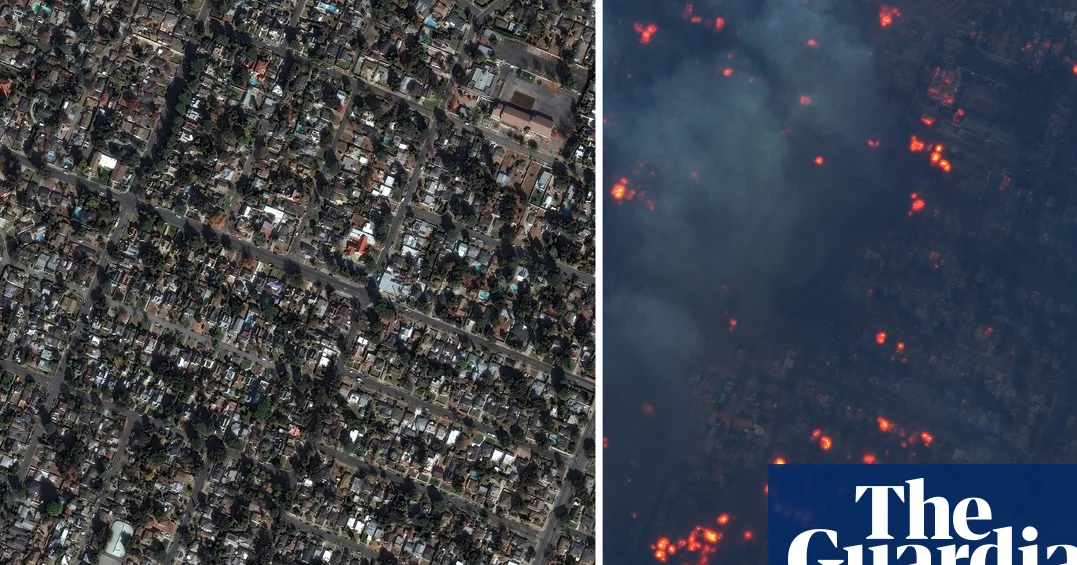Five people were killed, more than 1,000 structures destroyed and more than 130,000 residents were under evacuation orders in California, as fast-moving wildfires burned around Los Angeles, encircling the city.
On Tuesday, hurricane-force winds blew embers through the air, igniting block after block, and destroying an area of land about 42 sq miles (108 sq km) in size. By Wednesday night, six fires were burning from the Pacific Coast inland to Pasadena, most of them uncontrolled.
Satellite images showed the scale of the destruction from the Pacific Palisades fire, which burned more than 15,000 acres and left the coastline along the famous Malibu neighbourhood scorched black and buildings along the water burned to the ground.
Interactive slider showing the wildfires in California.
Satellite images show the Pacific Coast Highway along California’s Malibu coastline on 20 October, and on 8 January, after devastating wildfires.
In Pacific Palisades itself, more than half a dozen schools were either damaged or destroyed.
Los Angeles mayor Karen Bass said firefighters from across California and elsewhere had arrived to help along with air operations that were dousing flames. She warned they still faced “erratic winds”, though not of hurricane force like Tuesday evening, when much of the destruction occurred.
In Altadena, behind the mountains north of Los Angeles where the Eaton fire took hold, satellite images showed row upon row of charred residential streets, with smoke from the nearby fires blazes in the air. On Wednesday, the streets were filled with ash, with buildings everywhere in flames.
Pasadena fire chief Chad Augustin said between 200 and 500 structures had been damaged or lost from the Eaton Fire.
He said the city’s water system was stretched and was further hampered by power outages but even without those issues, firefighters would not have been able to stop the fire as embers blown by the intense winds ignited block after block.
Interactive slider showing the wildfires in California.
Satellite images show homes in Altadena, California on 6 January and on 8 January, covered in smoke.
In one image captured by satellite the red glow of fires burning near East Altadena Drive can be seen through thick black smoke.
Interactive slider showing the wildfires in California.
These satellite images show homes on East Altadena Drive in Altadena, California on 6 January and then alight on 8 January.
The fire scorched more than 16.5 square miles (43 square kilometres) and substantially damaged more than five school campuses. About 750 firefighters were working to halt the blaze.
The National Weather Service said gusty winds and very dry conditions would continue to fuel fires in the Los Angeles area. But winds have dissipated enough for aircraft to assist in fighting the fires, Augustin said.
“Tonight we have very mild wind conditions where we can get aircraft and a ton of additional resources getting their hands around this fire,” Augustin said. “That’s what gives me confidence that we’re going to get a handle on this fire.”
The fires struck at an especially vulnerable time for Southern California, which has yet to see significant rainfall since the start of the water year in October.
Then came the powerful Santa Ana winds, bringing dry desert air from the east toward the coastal mountains, fanning wildfires while blowing over the hilltops and down through the canyons.
Scientists said the fires, erupting well outside of the traditional wildfire season, mark the latest in weather extremes that are likely to escalate further as global temperatures continue to climb in coming decades.
With Associated Press and Reuters



